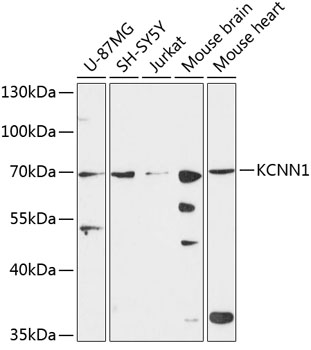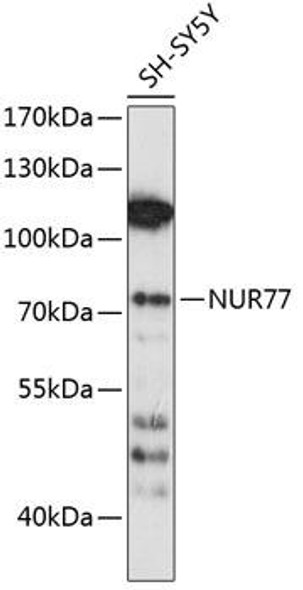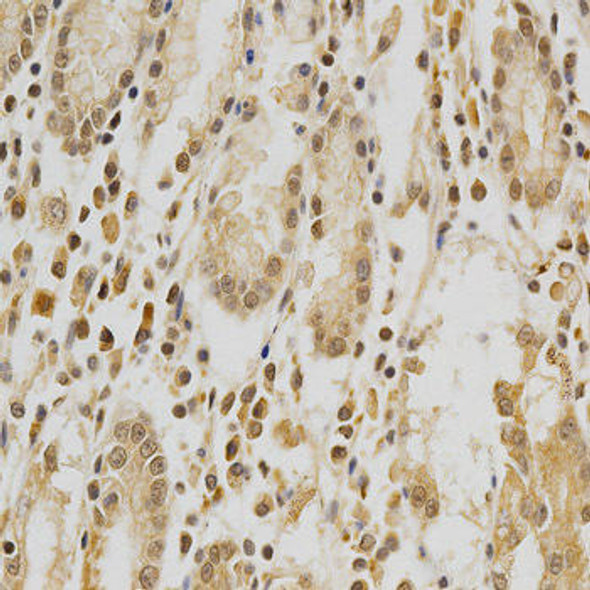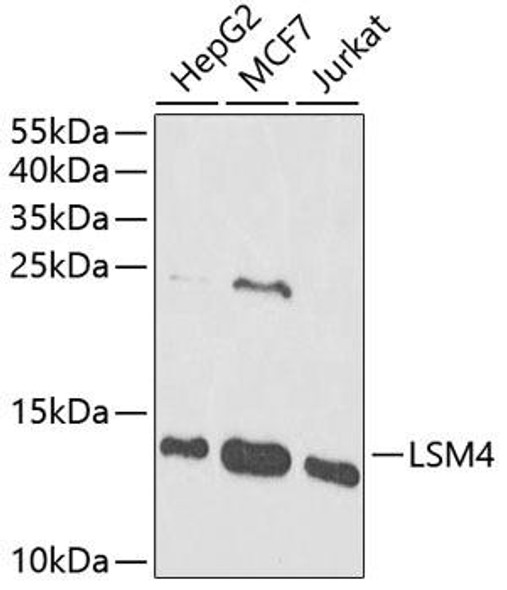Description
Anti-KCNN1 Antibody (CAB9322)
The KCNN1 Polyclonal Antibody (CAB9322) is a valuable tool for researchers studying the KCNN1 gene, which encodes for the calcium-activated potassium channel SK4. This antibody, generated in rabbits, exhibits high specificity and sensitivity towards human samples, making it suitable for use in Western blot applications. By specifically binding to the KCNN1 protein, this antibody enables accurate detection and analysis in a variety of cell types.The KCNN1 gene plays a crucial role in regulating calcium-dependent potassium channels, which are essential for controlling membrane potential and neurotransmitter release.
Dysregulation of KCNN1 has been implicated in various neurological disorders, such as epilepsy and Parkinson's disease. Furthermore, KCNN1 has also been linked to the development and progression of certain cancers.By utilizing the KCNN1 Polyclonal Antibody in research studies, scientists can gain valuable insights into the function of the KCNN1 gene and its role in disease pathology. This antibody is a valuable tool for investigating the molecular mechanisms underlying neurological disorders and cancer, ultimately paving the way for the development of novel therapeutic interventions.
| Antibody Name: | Anti-KCNN1 Antibody |
| Antibody SKU: | CAB9322 |
| Antibody Size: | 20uL, 50uL, 100uL |
| Application: | WB |
| Reactivity: | Human, Mouse |
| Host Species: | Rabbit |
| Immunogen: | Recombinant fusion protein containing a sequence corresponding to amino acids 1-90 of human KCNN1 (NP_002239.2). |
| Application: | WB |
| Recommended Dilution: | WB 1:500 - 1:2000 |
| Reactivity: | Human, Mouse |
| Positive Samples: | U-87MG, SH-SY5Y, Jurkat, Mouse brain, Mouse heart |
| Immunogen: | Recombinant fusion protein containing a sequence corresponding to amino acids 1-90 of human KCNN1 (NP_002239.2). |
| Purification Method: | Affinity purification |
| Storage Buffer: | Store at -20'C. Avoid freeze / thaw cycles. Buffer: PBS with 0.02% sodium azide, 50% glycerol, pH7.3. |
| Isotype: | IgG |
| Sequence: | MNSH SYNG SVGR PLGS GPGA LGRD PPDP EAGH PPQP PHSP GLQV VVAK SEPA RPSP GSPR GQPQ DQDD DEDD EEDE AGRQ RASG KPSN VG |
| Gene ID: | 3780 |
| Uniprot: | Q92952 |
| Cellular Location: | Membrane, Multi-pass membrane protein |
| Calculated MW: | 59kDa/61kDa |
| Observed MW: | 70kDa |
| Synonyms: | KCNN1, KCa2.1, SK1, SKCA1, hSK1 |
| Background: | Action potentials in vertebrate neurons are followed by an afterhyperpolarization (AHP) that may persist for several seconds and may have profound consequences for the firing pattern of the neuron. Each component of the AHP is kinetically distinct and is mediated by different calcium-activated potassium channels. The protein encoded by this gene is activated before membrane hyperpolarization and is thought to regulate neuronal excitability by contributing to the slow component of synaptic AHP. The encoded protein is an integral membrane protein that forms a voltage-independent calcium-activated channel with three other calmodulin-binding subunits. This gene is a member of the KCNN family of potassium channel genes. |
| UniProt Protein Function: | KCNN1: Forms a voltage-independent potassium channel activated by intracellular calcium. Activation is followed by membrane hyperpolarization. Thought to regulate neuronal excitability by contributing to the slow component of synaptic afterhyperpolarization. The channel is blocked by apamin. Belongs to the potassium channel KCNN family. KCa2.1/KCNN1 subfamily. 2 isoforms of the human protein are produced by alternative splicing. |
| UniProt Protein Details: | Protein type:Membrane protein, integral; Membrane protein, multi-pass Chromosomal Location of Human Ortholog: 19p13.1 Cellular Component: cell soma; plasma membrane; voltage-gated potassium channel complex Molecular Function:calcium-activated potassium channel activity; calmodulin binding; small conductance calcium-activated potassium channel activity Biological Process: potassium ion transport; synaptic transmission |
| NCBI Summary: | Action potentials in vertebrate neurons are followed by an afterhyperpolarization (AHP) that may persist for several seconds and may have profound consequences for the firing pattern of the neuron. Each component of the AHP is kinetically distinct and is mediated by different calcium-activated potassium channels. The protein encoded by this gene is activated before membrane hyperpolarization and is thought to regulate neuronal excitability by contributing to the slow component of synaptic AHP. The encoded protein is an integral membrane protein that forms a voltage-independent calcium-activated channel with three other calmodulin-binding subunits. This gene is a member of the KCNN family of potassium channel genes. [provided by RefSeq, Jul 2008] |
| UniProt Code: | Q92952 |
| NCBI GenInfo Identifier: | 124056468 |
| NCBI Gene ID: | 3780 |
| NCBI Accession: | Q92952.2 |
| UniProt Secondary Accession: | Q92952,Q5KR10, Q6DJU4, |
| UniProt Related Accession: | Q92952 |
| Molecular Weight: | 61,827 Da |
| NCBI Full Name: | Small conductance calcium-activated potassium channel protein 1 |
| NCBI Synonym Full Names: | potassium calcium-activated channel subfamily N member 1 |
| NCBI Official Symbol: | KCNN1 |
| NCBI Official Synonym Symbols: | SK1; hSK1; SKCA1; KCa2.1 |
| NCBI Protein Information: | small conductance calcium-activated potassium channel protein 1 |
| UniProt Protein Name: | Small conductance calcium-activated potassium channel protein 1 |
| UniProt Synonym Protein Names: | KCa2.1 |
| Protein Family: | Small conductance calcium-activated potassium channel protein |
| UniProt Gene Name: | KCNN1 |
| UniProt Entry Name: | KCNN1_HUMAN |





